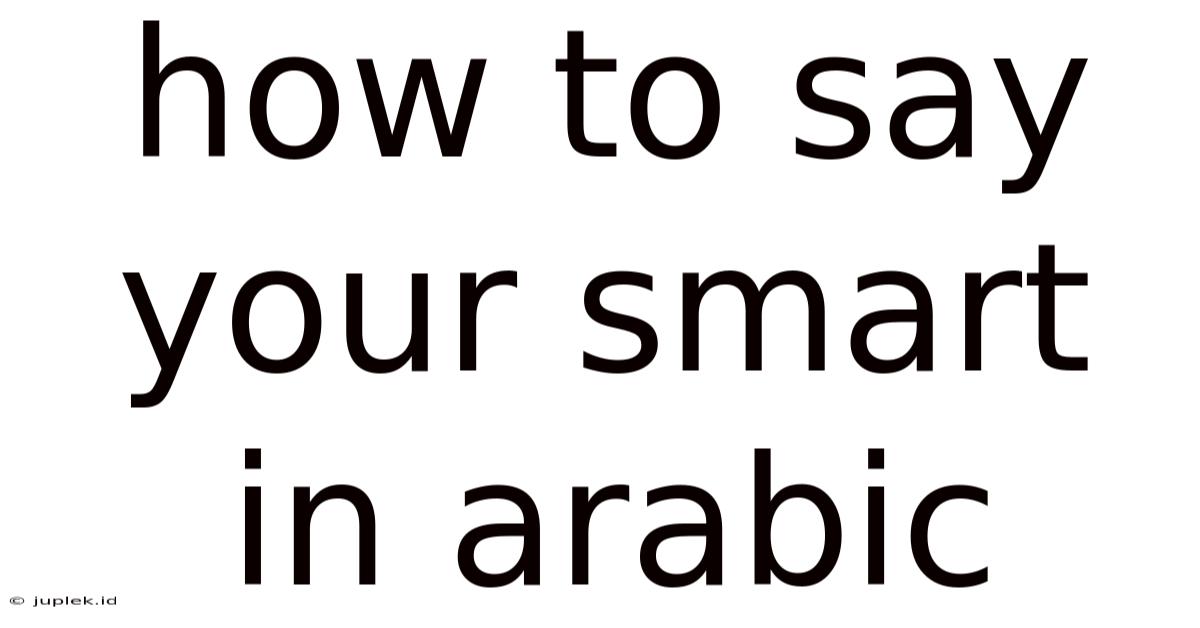How To Say Your Smart In Arabic

Discover more detailed and exciting information on our website. Click the link below to start your adventure: Visit Best Website meltwatermedia.ca. Don't miss out!
Table of Contents
How to Say You're Smart in Arabic: Beyond "Ana Dhakī"
The Arabic language, rich in nuance and expression, offers a multitude of ways to convey intelligence, depending on the context, the audience, and the specific shade of meaning you wish to impart. Simply translating "I am smart" as "أنا ذكي" ( Ana dhakī) – the most straightforward translation – often falls short of capturing the full spectrum of intelligence and its various manifestations. This article delves deeper into the intricacies of expressing intelligence in Arabic, exploring various vocabulary, idiomatic expressions, and cultural considerations.
Beyond the Literal: Nuances of Intelligence in Arabic
While Ana dhakī (أنا ذكي) – I am smart (masculine) and Ana dhakīyah (أنا ذكية) – I am smart (feminine) – are perfectly acceptable in informal settings, they lack the richness and sophistication that Arabic offers. The concept of "smartness" itself is multifaceted. Arabic differentiates between various types of intelligence:
-
ذكاء (Dhakā’): This is the most common word for intelligence, encompassing general intellectual ability, quick-wittedness, and sharp thinking. It’s the root word for dhakī (smart).
-
فطنة (Fiṭnah): This term describes shrewdness, cleverness, and perceptiveness, often in a practical or intuitive sense. Someone with fiṭnah is quick to grasp situations and find solutions.
-
عبقرية (ʿUbquriyya): This signifies genius or exceptional intellectual talent, a level far exceeding ordinary intelligence. It implies originality, innovation, and profound insight.
-
براعة (Barāʿah): This refers to skill and dexterity, often in a particular field. It speaks to expertise and mastery, suggesting intelligence applied practically.
-
حكمة (Ḥikmah): This signifies wisdom, discernment, and sound judgment, acquired through experience and reflection. It's a more mature and profound type of intelligence.
Context Matters: Choosing the Right Expression
The choice of vocabulary depends heavily on the context. Saying "I am smart" in different scenarios might require different words:
-
In a casual conversation with friends: Ana dhakī (أنا ذكي) or Ana dhakīyah (أنا ذكية) is perfectly adequate.
-
Describing academic achievements: Phrases highlighting specific skills might be more appropriate, such as "أنا متميز في الرياضيات" (Ana mutamīz fī-r-riyāḍiyāt) – I excel in mathematics, or "أنا جيد في اللغة الإنجليزية" (Ana jayyid fī-l-luġah al-ʾInglīziyya) – I am good at English.
-
In a professional setting: Emphasizing expertise and experience is crucial. Instead of stating "I am smart," one might say "لدي خبرة واسعة في هذا المجال" (Laday khubrah wāsiʿah fī hādhā-l-majāl) – I have extensive experience in this field.
-
Showing intellectual prowess: Using words like ʿUbquriyya (عبقرية) or Ḥikmah (حكمة) would be overly boastful unless justified by specific achievements.
Idiomatic Expressions: Adding Depth and Nuance
Arabic utilizes numerous idioms and proverbs to convey intelligence indirectly and subtly. These expressions are far more nuanced and culturally sensitive than a direct translation of "I am smart":
-
له عقل راجح (Lahu ʿaql rājih): He/She has a sound mind. This implies good judgment and clear thinking.
-
عنده ذكاء خارق (ʿIndahu dhakā’ khāriq): He/She has exceptional intelligence. This suggests an extraordinary level of intellectual ability.
-
شافِر (Shāfir): This word implies sharpness of mind and quick wit, often used to describe someone who is clever and resourceful.
-
فطن (Fiṭin): This adjective describes someone who is perceptive and insightful, often used to praise someone's ability to understand complex situations.
Cultural Considerations: Avoiding Boastfulness
In many Arab cultures, direct boasting about one's intelligence is considered impolite. Humility is often valued, and expressing intelligence subtly is preferred. Instead of explicitly claiming to be smart, one might demonstrate intelligence through actions, insightful contributions to conversations, or showcasing expertise in a particular field.
Examples in Context:
Let's illustrate the use of different expressions in different scenarios:
-
Scenario 1: A student discussing their grades with a teacher: Instead of "I'm smart," the student might say, "أنا أُجِيدُ الفهم بسرعة" (Ana ujid al-fahm bisurʿa) – I grasp things quickly, or "أنا أُحِبُّ التعلّم" (Ana uḥibbu-t-taʿallum) – I love learning.
-
Scenario 2: A colleague presenting a project: Instead of "I'm smart," the colleague might say, "لقد عملت بجدّ لإنجاز هذا المشروع" (Qad ʿamilt bi-jad li-ʾinjāz hādhā-l-mashrūʿ) – I worked hard to complete this project, or "أعتقد أن هذا الحلّ هو الأنسب" (ʾAʿtaqid ʾanna hādhā-l-ḥall huwa-l-ʾansab) – I believe this solution is the most appropriate.
-
Scenario 3: Friends discussing a challenging puzzle: One friend might say about another, "هذا الشخص فطن جداً" (Hādhā-sh-shakhṣ fiṭin jiddan) – This person is very perceptive.
Conclusion: A Multifaceted Approach to Expressing Intelligence
Expressing intelligence in Arabic is far more nuanced than a simple translation of "I am smart." The choice of vocabulary and phrasing depends heavily on the context, the audience, and the specific aspect of intelligence you wish to convey. Learning to use various words, idioms, and proverbs will enable you to express yourself more effectively and authentically, reflecting the richness and complexity of the Arabic language and culture. Remember that demonstrating intelligence through actions and insightful contributions is often more effective than making a direct claim. By understanding these cultural nuances and the various shades of meaning embedded in the Arabic lexicon, you can navigate conversations about intelligence with greater sensitivity and precision.

Thank you for visiting our website wich cover about How To Say Your Smart In Arabic. We hope the information provided has been useful to you. Feel free to contact us if you have any questions or need further assistance. See you next time and dont miss to bookmark.
Also read the following articles
| Article Title | Date |
|---|---|
| How To Say Holoprosencephaly | Apr 08, 2025 |
| How To Say In Tamil I Love You | Apr 08, 2025 |
| How To Say Limoges | Apr 08, 2025 |
| How To Say Dean In Japanese | Apr 08, 2025 |
| How To Say Hoshaiah | Apr 08, 2025 |
